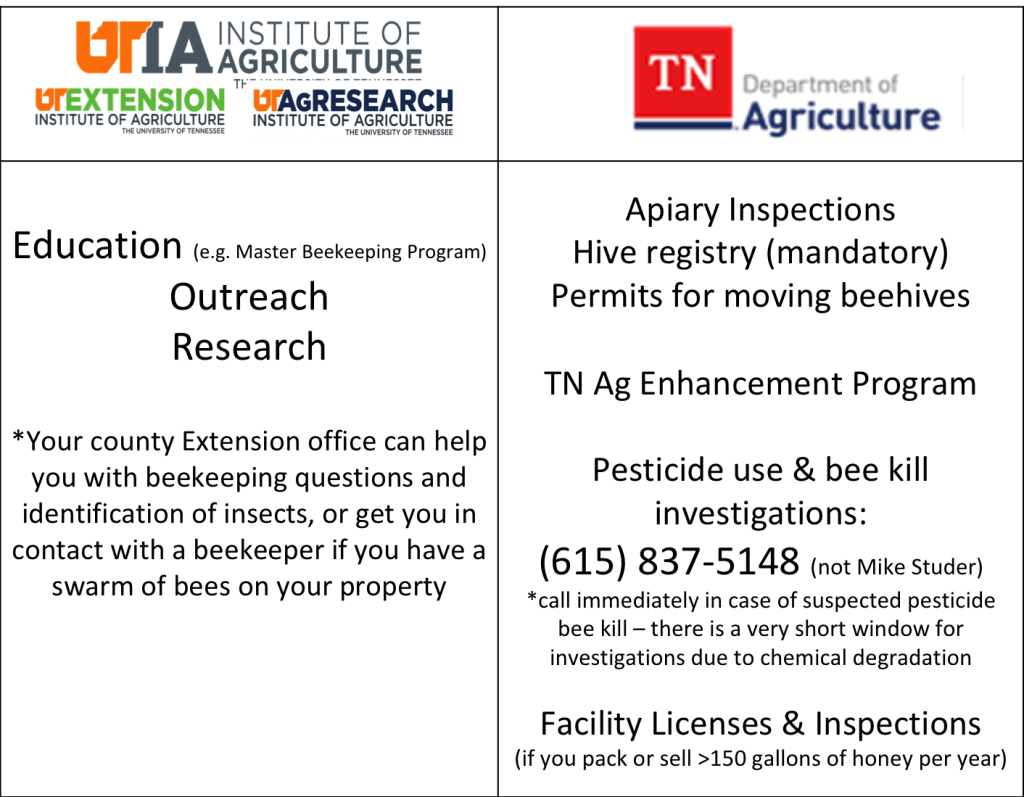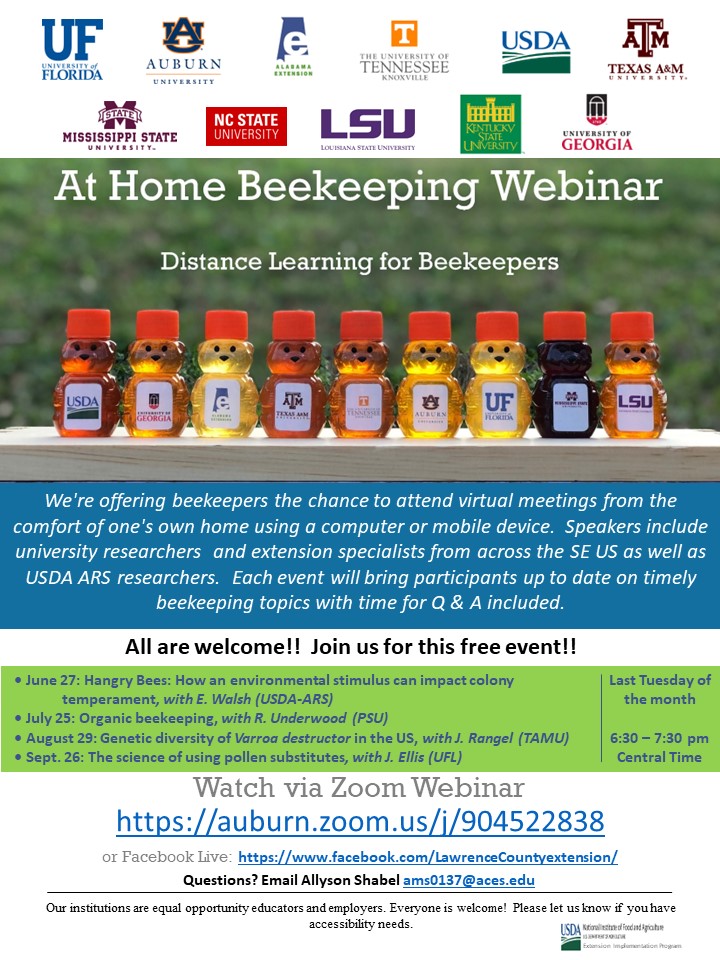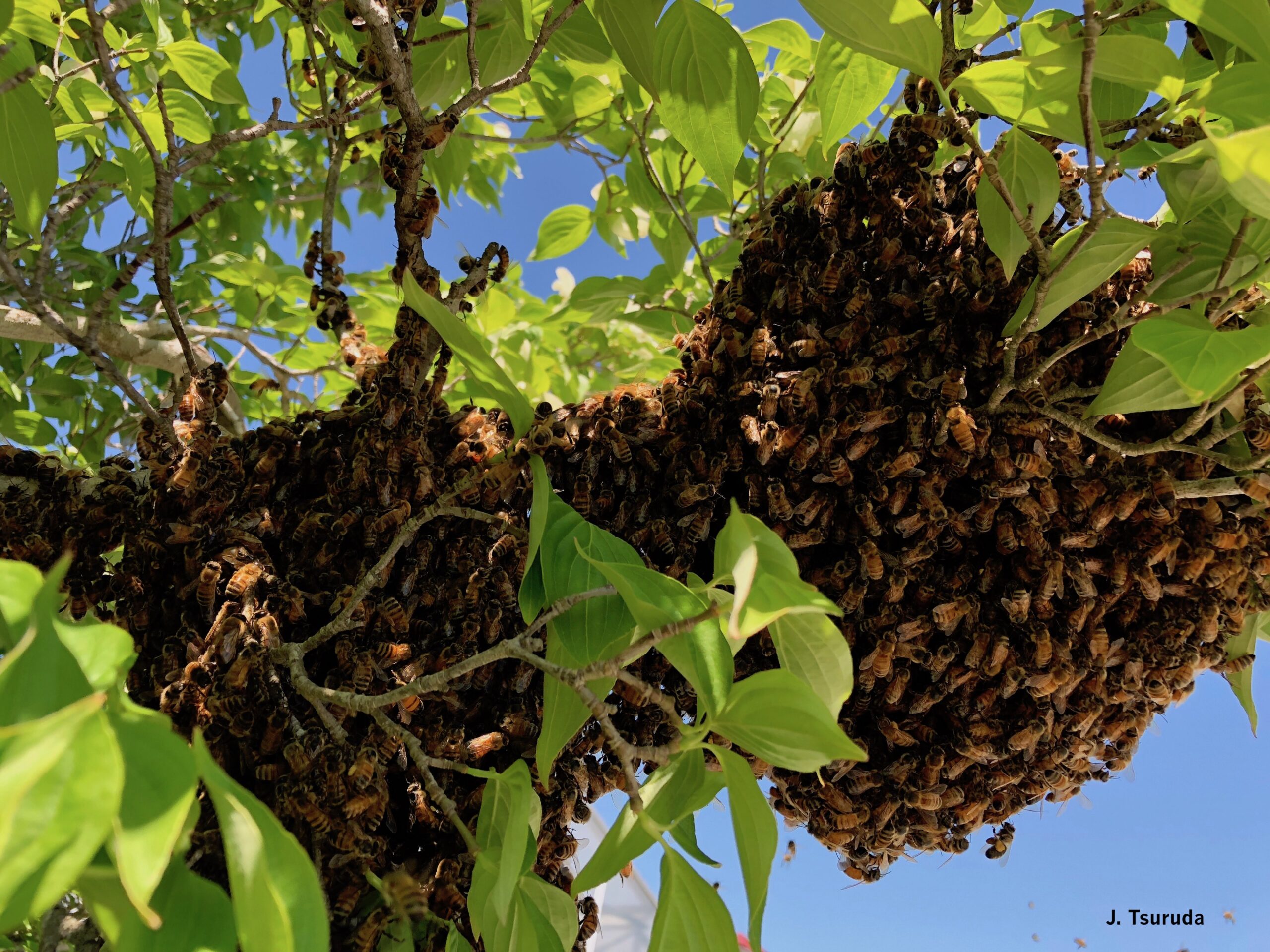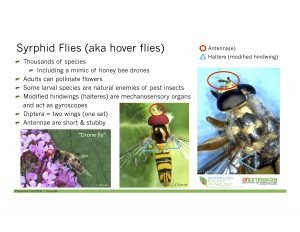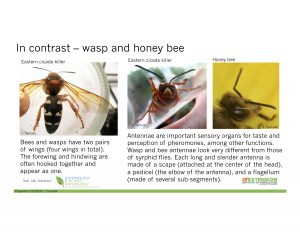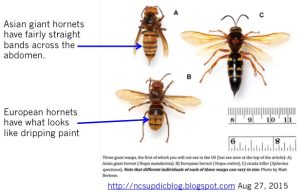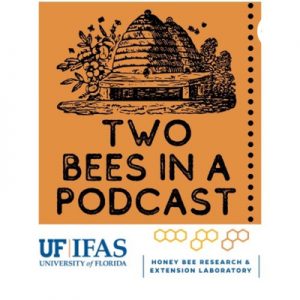YELLOW-LEGGED HORNETS IN THE NEWS…
*Update: GA Dept of Ag found and destroyed a nest of yellow-legged hornets in the area of Savannah, GA – great work! https://agr.georgia.gov/pr/yellow-legged-hornet-nest-eradicated-savannah-area
A new, non-native hornet was detected in GA recently, the yellow-legged hornet, Vespa velutina. Read GA’s Dept of Ag post about the August 9th find by a GA beekeeper near the port of Savannah: https://agr.georgia.gov/pr/discovery-yellow-legged-hornet-confirmed-georgia-first-time
In its natural habitat in Asia, the yellow-legged hornet makes large, paper nests in trees or the eaves of structures. Their biology is similar to that of other hornets and wasps so the best distinguishing characteristics for identification are based on physical attributes of the insect itself. Many wasps/hornets have some of these features, so the combination of these characteristics is worth noting. While the bases of the legs are dark, the ends are yellow or pale. The thorax and head are dark in color, but the front of its “face” is yellow. The abdomen is dark on the anterior end, and becomes more yellow near the posterior tip; sometimes with thin yellow stripes. If you have a specimen or can take a high quality, close-up photo, you can also look for a distinguishing wide, yellow band/stripe on the 4th abdominal segment (4th from the anterior (head) end, not from the tip/rear end of the abdomen).
At this time there is no evidence that this hornet is in TN. Given the potential for this hornet to spread and its impact on pollinators and beekeeping, we want beekeepers and citizens to be vigilant but to also check out the resources to look for the distinguishing characteristics before submitting reports, photos, and specimens to their county Extension agents. Before submitting an identification request, please read this post from UGA’s bee lab that has photos and tips for beekeepers: https://bees.caes.uga.edu/bees-beekeeping-pollination/yellow-legged-hornet.html.html. So far, most of the submissions we have received have been European hornets, which are common this time of year. While they can also have yellow on their legs, they can be ruled out based on size and the markings on the abdomen (that look like dripping paint). Another lookalike this time of year is the Eastern cicada killer, but again, it is larger and has distinct abdominal markings. Take a look at our previous post that shows the markings of European hornets, Eastern cicada killers, and Northern giant hornets: https://www.facebook.com/EPPTN/posts/5215028821877753
Overview of UT and TDA Apiculture Assistance
The UT Institute of Agriculture and the TN Department of Ag (TDA) work together to support the beekeeping industry in TN. This chart summarizes some of the responsibilities under each agency. Links for county Extension offices and TDA can be found below the chart.
Click HERE to find your county office. *Just click on your county and then “About Us” to get the list of staff – please email your Agriculture and Natural Resources agent(s).
TDA Office of the State Apiarist (Mike Studer) (*For assistance with basic inspections, contact your local beekeeping club to see if they have a local inspector or mentor who can help you. Regional or state-level inspections are required for regulatory services such as permits.) Apiary registration is handled by TDA (not UT) – please send correspondence related to registration to TDA.
TN Ag Enhancement Program (TAEP) This cost-share program supports TN beekeepers who have at least five years of experience and 15 or more hives – beekeeping has challenges but this program is great motivation to try to stick with it and plan to grow your hobby into a production. Honey bees fall under Application B for Producer Diversification (<–click for application materials). Applications are accepted October 1-7, 2023. Questions? Please contact producer.diversification@tn.gov
TDA pesticide information – please call (615) 837-5148 for assistance with a suspected pesticide-related bee kill. Time is of the essence due to the short window of opportunity for an investigation so this is the first call to make.
TDA Food Safety – if you pack or sell more than 150 gallons of honey per year, you must be licensed and inspected by the State of TN as a food manufacturing facility. Contact TDA Consumer and Industry Services Division at (615) 837-5153 for more information.
TN Master Beekeeping Program
Classes are coordinated by the State Apiculturist (Dr. Jennifer Tsuruda) and the State Apiarist (Mike Studer) and put on in cooperation with county Extension offices.
Do not be confused by the name – there are no prerequisites for this Basic Level class and you will learn skills to help you be a successful beekeeper – even if you do not have bees yet. Class will be capped at 35 participants & may be cancelled if a minimum of 15 participants is not met. These classes are for participants aged 18 and over; younger youth are encouraged to participate in their county Extension 4-H Entomology & Beekeeping Program. Please note that if you intend to take the Advanced class in the future, the Basic Level class is a prerequisite – no waivers and no exceptions.
2023 CLASSES
*Read instructions on this page and registration page carefully before registering. You will receive a confirmation email after you register successfully – check your spam/junk/quarantined folders. Your confirmation email is your proof of registration. Dr. Tsuruda will send an email to registered participants with exact locations and logistical information 3-7 days before the start of class – check your spam/junk/quarantine folders. If you do not receive the confirmation email or the email from Dr. Tsuruda, you likely did not complete the registration process and are not registered for the class.
When classes are developed, they are posted on this UT Apiculture website and EPP’s Facebook site, as well as shared with those who fill out the Interest Form, county Extension offices, and the TN Beekeepers Association. If you hear talk about classes from others, always check this official website to verify.
***As of 10:45am 5-8-23 everyone who has filled out the Interest Form has been emailed regarding the opening of registration for the basic classes as well as the advanced classes. No additional notifications will be sent out unless additional classes are added.
BASIC CLASSES
May 18-19 – Davidson County (Nashville) – CLASS IS FULL – all registered participants were emailed May 15th, 12:33pm ET; check your spam/quarantine/junk folders; if you did not receive an email, forward your emarketplace confirmation to jtsuruda@utk.edu
July 6-7 – Weakley County (Martin) (*Minimum registration has been met!)
August 3-4 – Union County (Maynardville) (Class has reached maximum – fill out the Interest Form and indicate you want to be on the waiting list for this class if there are any cancellations.)
August 10-11 – Carter County (Elizabethton) (*Minimum registration has been met!)
August 17-18 – Franklin County (Winchester) (*Minimum registration has been met!)
September 1-2 (*Fri-Sat) – Lauderdale County (Ripley) (*Minimum registration has been met!)
September 14-15 – Rhea County (Dayton) (Class has reached maximum – fill out the Interest Form and indicate you want to be on the waiting list for this class if there are any cancellations.)
Register for a Basic MBP class: https://tiny.utk.edu/mbp_basic
ADVANCED CLASSES
Knox County – Knoxville, TN – Advanced (queen rearing)
Date: April 28-29, 2023 (Fri & Sat)
Davidson County – Nashville, TN – Advanced (queen rearing)
Date: May 4-5, 2023 (Thu & Fri)
Madison County – Jackson, TN – Advanced (nutrition/forage plots)
Date: June 1-2, 2023 (Thu & Fri)
*We are very busy preparing for classes so emails requesting waiver/exceptions will not receive responses, as it is stated here and on the registration site that there are no waivers or exceptions. Registration will be canceled if our database does not show completion of the Basic class. We prefer participants in the Advanced class have at least 5-10 years of experience beekeeping to ensure the level of knowledge and experience needed for success in the course.
Registration for advanced classes has closed – all advanced classes for 2023 have been completed.
Please also consider attending a free, online beekeeping series to continue learning about bees and beekeeping! UT Apiculture is proud to be a part of this collaborative and diverse team! We want to make sure bee clubs and beekeepers do not feel obligated to hold in-person monthly meetings so now beekeepers (and bee enthusiasts) from around the world can tune in and continue their beekeeping education from the safety and comfort of their homes. *Note: this series does not qualify for TAEP.
If Zoom registration is full, you can still watch via the Lawrence County Extension Facebook page (no registration needed – just go to the site a few minutes before 6:30pm Central Time)! Presentations will also be posted on the Facebook site for 2 weeks in case you missed it live or want to watch the presentation again. Please do not take screenshots or copy any slides.
https://www.facebook.com/LawrenceCountyextension/
Swarm season is waning but stay on alert!
Honey bee colonies reproduce by dividing and swarming. Generally, around 40-75% of the adult bee population and the old queen leave and find a temporary site (often times a tree branch), where they will hang out while some individual bees go scouting for permanent nesting sites. A collective decision is made and the swarm takes flight for the permanent location, where the colony will be established. If you are a homeowner, who sees a cluster of bees, please contact your local beekeeping association to have a local beekeeper collect the swarm. Many of the local beekeeping associations have a swarm catcher list on their websites. You can also try contacting your county Extension office. It is always helpful if you have photos (to confirm they are actually honey bees and not yellowjackets, paper wasps, or another type of stinging insect) and have exact location information.








